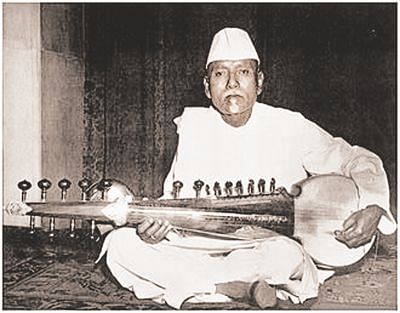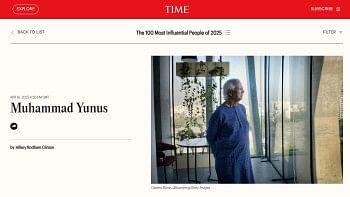A recapitulation of Ustad Allauddin Khan

BTV had invited me through the good office of Ustad Shahadat Hossain Khan to deliver a talk on Ustad Allaudin Khan on August 23 and the programme would be aired on his death anniversary, which falls on September 6 (today). Memories resurfaced of the '70s when my sitar teacher, Ustad Mir Kashem Khan, used to tell his students at Jago Art Centre about his mentor. He learnt the sitar along with his other siblings in Kolkata.
Wasn't the mentor a sarodist, one exclaimed! Yes, but he not only played the sarod, but he was equally good at all instruments including the sitar, surbahar, sursringar, tabla, pakhawaj and violin.
The great Ustad Allaudin Khan was born in 1881 and died in 1972. What he did in one lifetime (being close to 100 years) could not have been accomplished in 300 years. His father Ustad Sabdar Hossain Khan (also known as Sadhu Khan) and elder brother Fakir Aftabuddin were inclined to music and performed for themselves. They knew very well that to make a career of this profession was tantamount to living hand to mouth. Young Alam, as Ustad Allaudin Khan was called, was restrained from the musical instruments.
The more these two gentlemen wanted Alam to go to school at Shibpur village in Brahmanbaria (now in Bangladesh) where he was born, the more the young lad rebelled. At the age of eight or ten, he ran away from home to join a 'jatra party'. He played all the instruments (dhol, tabla, pakhawaj, shehnai, clarinet, cornet and trumpet) and was delighted at finding his forte.
A narrative about his life for nearly a decade is missing until we observe that at the age of 14 he presented himself at the feet of a great vocalist named Nulo Gopal, otherwise known as Gopal Krishna Bhattacharja. Many know him as Charavarty. His strict instructions to Alam at first bewildered the young lad. He had to be groomed the same way Nulo was groomed for strictly 12 years in the 'Guru-Shishya Parampara'. Young Alam agreed with fascination. The grooming commenced and he never looked back.
Unfortunately for him, Nulo passed away seven years later. Alam then worked for the Star Theatre in Kolkata where he became a disciple of Amritalal Dutt (known popularly as Habu Dutt), a close relative of Swami Vivekananda. Young Alam also participated in the frequent orchestral parties held by Habu. He also met Lobo, a bandmaster from Goa, who taught him other stringed instruments like the violin. Habu and Lobo's influence on Alam with lessons in Eastern and European classical music (both used all the western instruments, specially violin as well as a few Indian ones) led to the formation of the 'Maihar Band'.
The pedagogy pursued by the maestro was shaped from an early age as he played many instruments apart from presenting concerts in sarod. Indian instruments were used, to put together an orchestra, popularly known as the Maihar Band.
Alam got interested in the sarod after a concert by Ustad Ahmed Ali Khan at Jagat Kishore Acharya's zamindari court at Muktagachha (now in Bangladesh).
When his Guru Nulo passed away, he took a vow never ever to take lessons in vocal music. The seven years of strict learning the 'Paltas' and 'Sargams' made him a young guru of sorts. He could think about the notations in his head and could reflect these notations in writing as well. Thus it made it easier for him to learn the stringed instruments. Now you had to use your fingers instead of the voice. Any good stringed musician can sing as well.
Ustad Ahmed Ali knew that young Alam had the capacity to overtake his guru. A day came when he was told that he had to move forward and encounter a greater ustad (following the tradition of shikkha, dikkha and parikkha meaning training, initiation and evaluation). He was taken to Rampur where Ahmed Ali's roots were.
This was a place of great musicians. At least 500 musicians were competing against each other. A short-list of 50 was really the best and of that the King of Kings was the great Ustad Wazir Khan, the greatest veena player of the time, and the direct descendant of Mian Tansen. He belonged to the court of the Nawab of Rampur.
But how to get to him? A Maulana Sahib had suggested that he would write a letter in Urdu introducing Alam, but he had to market himself. The spirit was such that had he not been able to meet the Great Wazir Khan, he would take two ounces of opium and end his life. He stationed himself on the road and as the Nawab's vehicle finally approached, he threw himself in front of it. The rest is history. His devotion to music was acknowledged. He was told to play the instruments. He played them one after the other. The Nawab sang a very difficult gamak taan but Alam meekly replied that such a taan would be difficult to write down. He was a keen observer and not an egomaniac. He observed the annoyance in the eyes of the Nawab that he knew more than he. The Nawab called for Ustad Wazir Khan and the binding ceremony took place.
Ustad Wazir embraced Alam after two and half years, observing that although he lied that he was an orphan, which he was not since a letter came to the Nawab's court stating that the wife of Alam was about to commit suicide. The love for music was enough to keep young Alam even from his wife. After his return from his home, Ustad Wazir Khan considered Alam as his foremost and best disciple outside of his own family. He taught him all the secrets of the art of music that the members of the Tansen family possessed. He was permitted to play the veena (also called 'been') since it was traditionally restricted to the Beenkar gharana. Before Wazir's death, the ustad blessed his student stating that Alam's name and the names of his disciples would live forever and carry on the great tradition of the Beenkar gharana and the glory of Mian Tansen.
Ustad Allaudin Khan was fond of compound ragas, and created many ragas of his own, including Arjun, Bhagabati, Bhim, Bhuvaneshvari, Chandika, Dhabalashri, Dhankosh, Dipika, Durgeshvari, Gandhi, Gandhi Bilawal, Haimanti, Hem-Behag, Hemant, Hemant Bhairav, Imni Manjh, Jaunpuri Todi, Kedar Manjh, Komal Bhimpalasi, Komal Marwa, Madanmanjari, Madhabsri, Madhavgiri, Malaya, Manjh Khamaj, Meghbahar, Muhammed, Nat-Khamaj, Prabhakali, Raj Bijoy, Rajeshri, Shobhavati, Subhabati, Sugandha and Surasati. Many of these have not become common Maihar repertoire; Manjh Khamaj is perhaps the best known.
Allauddin stayed at Maihar from 1918 to his death. In 1955,he established the Maihar College of Music. He was given the Sangeet Natak Academy Award in 1952, and the Padma Bhushan and Padma Vibhushan India's third and second highest civilian decorations -- in 1958 and 1971, respectively.
He experimented with his disciples as his son Ali Akbar Khan was taught the sarod, his daughter Annapurna Devi learned the Surbahar, Ravi Shankar and Nikhil Banerjee played the sitar, Rabin Ghosh played the violin and Baijnath Singh and Panna Lal played the bansuri (bamboo flute).

 For all latest news, follow The Daily Star's Google News channel.
For all latest news, follow The Daily Star's Google News channel. 



Comments